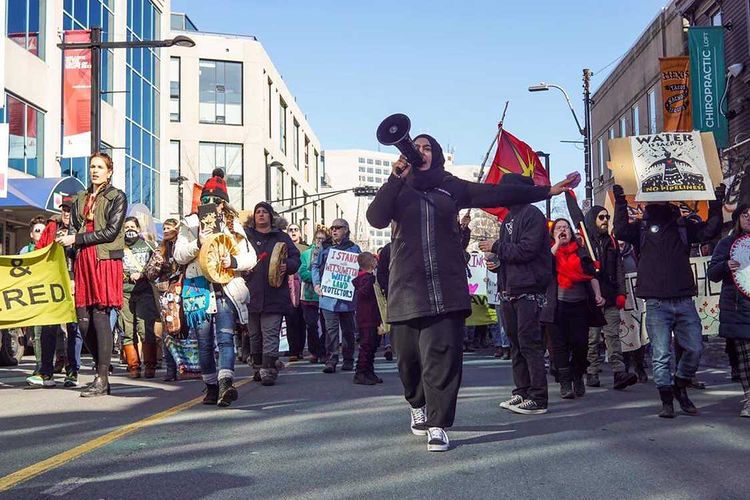On a beautiful sunny day, Masuma Khan was taking a walk at a park in Halifax when she found out through a friend that a family of four was killed and targeted for being Muslim in London, Ont.

The murdered family was taking a walk, too, when the driver of a black pickup truck mounted the sidewalk and struck the family members Sunday evening, according to the local police.
The victims have been identified as Salman Afzaal, 46, his 44-year-old wife Madiha Salman, their 15-year-old daughter Yumna Afzaal and Afzaal’s 74-year-old mother.
Nine-year-old Fayez Afzaal suffered serious but non-life-threatening injuries.
“My stomach just started aching, like I felt pain. And I started thinking about how that could have been any one of us. That could have been any of our families,” said Khan in a Zoom interview with Global News.
A photo of Malcolm X, an African-American Muslim minister and human rights activist, and a poster featuring a woman wearing the hijab can be seen hung on the walls of Khan’s room as she described how she felt.
Khan said what happened made her feel so angry because she feels like a lot of people play down the realities of Islamophobia.
“Often we’re told that the kind of violence that Muslims face for practicing their faith is justified based off of stereotypes of Muslims,” she said.

The ways those stereotypes, such as believing Muslims are oppressed or carrying some kind of weapon under their clothes, is a big issue that Khan is set to discuss live on Instagram on Thursday evening.
Through the Abolish The Police-HFX group’s page, Khan will be hosting an “Islamophobia Kills” online teach-in dedicated to the Muslim family in London, Ont.
She will be talking with Muslims across Canada about their experience and how non-Muslims can do better, with the chat scheduled to take place at 7 p.m.
“The reality is though there may be people who see me and treat me with respect, in their hearts of hearts, they have this bias. And that kind of bias needs to be deconstructed. It needs to be unlearned. Like, where is this coming from?” said Khan.

Get breaking National news
“Thoughts like, ‘You don’t deserve to be here,’ or ‘Go back to where you came from.’ The reality is … that we’re here because we have no choice. We’re here because our homelands are not safe due to colonialism, due to imperialism, due to wars, and all this stuff that we have been displaced here,” she added.
Khan, who was born and raised in Halifax, said she has been dealing with Islamophobia her whole life, even before she wore the Hijab.
“My first experience of Islamophobia was when I was four years old … someone was yelling at my dad, calling him a foreigner and telling him to leave,” she said.

Then 9/11 happened, and kids would come into the family’s former store in Spryfield and ask them where they were hiding Osama bin Laden and make other Islamophobic remarks.
“My first year wearing hijab, you know, that was the first threat of violence I received just walking around the Halifax Shopping Centre. And this older teenager comes up to me saying that they want to shank me because I’m wearing the scarf on my head, which she actually referred to as a rag,” said Khan.
“Then I started doing more community organizing, and I started getting death threats and rape threats and very harmful messages.”
- Bombardier warns of ‘significant impact’ to travellers from Trump’s threat
- Stepfather of two missing N.S. kids charged with sexual assault of adult, forcible confinement
- Trump threatens Canada with 50% tariff on aircraft sold to U.S.
- Canadians have billions in uncashed cheques, rebates. Are you one of them?
That kind of experience made it hard being a visibly Muslim person “because the whole world is peddling these stereotypes about you,” Khan said.
But she has learned to love herself even on hard days.
“As much as Islamophobia has harmed me in my life, it’s also shaped who I am and it’s made me connect with my faith in a healthier way because I’m able to understand where these stereotypes come from and know that that’s not what my faith is about,” she Khan.
She said she has also received so much love from the Mi’kmaq, African-Nova Scotian and other racialized communities because they know what it’s like to face this kind of oppression, and that helped her deal with it better.
“All of our liberations are connected and none of us will be free until all of us are free. So Islamophobia is inherently tied to racism and white supremacy and xenophobia and all these things. You can’t tackle one without the other,” Khan said.
She said it’s time for people to stand up against ultra-right discourses and ideas, and to educate themselves on how Islamophobia works.
If someone is wondering what they can do to support Muslims, Khan suggests that they take a good look at their own circle of friends and neighbours.
“Why is it that you have no one in your life that you love or care about that is Muslim? Why don’t you have trust with a Muslim person?” said Khan.
“Maybe you need to do some unlearning so that you can open up your heart enough to actually love a Muslim person because we deserve that, too,” she added.
Khan said that if you see a visibly Muslim person or someone who has a Muslim name, take the time to say their name correctly and to smile at them.
“A Muslim will smile back at you. It’s part of our faith,” she said. “We’re not this group of extremist people that are trying to bring Sharia to Canada…We’re just trying to live.
“The greatest thing you can do is support our existence and dismantle Islamophobia with us.”









Comments